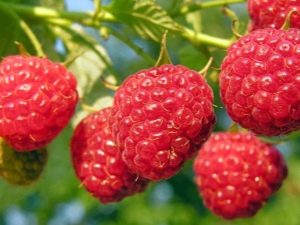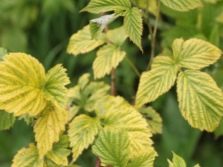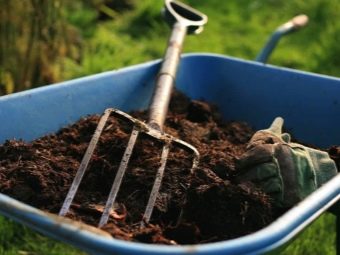Feeding raspberries: how to increase yields with fertilizer?

One of the most important conditions for obtaining decent yields when growing raspberries is competent and timely fertilization of the soil. Fertilization compensates nutrients taken by the plant from the earth and prevents its depletion. A properly-fed shrub regularly bears fruit, gives rich yields of high-quality berries, rarely gets sick and is hardly affected by pests.
What does the plant lack?
To process and feed the plant you need to start in March and in the future to provide him with proper care. Foliar system, for example, loves copper sulfate, magnesium sulfate or droppings. A more detailed feeding scheme will be discussed below.
In appearance of the plant
The appearance of the shrub will tell the grower about the lack or excess of certain elements and nutrients. Even a novice gardener will be able to determine the presence of problems and eliminate them.
There are the following parameters, which determine whether the plant needs additional feeding:
- small foliage, weakened, thin stems have a light green tint - the consequences of a lack of phosphorus;
- leaves turn yellow, but at the same time green streaks remain - little iron;
- leaves turned yellow in the middle of summer, growth slowed down - not enough magnesium;
- leaves that bloom in spring do not increase in size - the plant needs nitrogen;
- the leaves look as if they were burnt in the sun, turn brown and dry around the edges - the thing is lack of potassium;
- The shoots began to grow sharply, the leaves are too large and dark, and the berries are small and sour or fruit ovaries are completely absent - there is too much nitrogen in the soil.
The more carefully the raspberry jam will be monitored, the more likely it is that changes will be noticed in time and fertilizer and fertilizing will be correctly made. Thoughtless use of them can lead to a completely unpredictable result.
What fertilizers are suitable?
Like any plant, for good growth and fruiting raspberries need organic and mineral supplements containing iron, magnesium, potassium, and nitrogen. Their choices and proportions depend on the season, the state of the plants, the quality of the soil.
- In the spring mineral dressing will be suitable: superphosphate, potash salt, nitrogenous and complex mineral fertilizers.
- In the autumn period raspberries need nutrients of organic origin. Sources of such are rotted manure and compost, peat, chicken and goat droppings.
The amount and necessity of the introduction of a fertilizer will tell the appearance of the shrub. But it is worth remembering that raspberries react much worse to an oversupply of nutrients than to a deficiency.
It is necessary to introduce feedings very carefully, since too generous fertilization of the soil will completely ruin the crop.
What do you need when landing?
Take care of the full nutrition of shrubs is even during their planting. To do this, in the autumn digging it is necessary to make a certain amount of fertilizer. It depends on the initial state of the soil and its provision with substances useful for raspberries.
For example, poor soils are fertilized in the following way: 10–15 kg of organic, 20–30 g of potash and 30–45 g of phosphate fertilizers are laid on 1 m2. 10–12 kg of organic, 15–25 g of potash and 20–45 g of phosphate fertilizers are applied to rich soils per 1 m2 of the future raspberry.
When planting shrubs on medium-sized sod-podzolic soils, humus or dung-peat compost in the amount of 8-10 kg, as well as superphosphate (150-200 g) and potassium sulfate (70-80 g) are laid The latter can be replaced with wood ash in the amount of 500-600 g. Fertilizers should be properly mixed with the ground from the planting pit.
Raspberry is considered to be a very unpretentious crop and feels better on other acidic shrubs than other berry bushes.But if the soil in the area allotted for raspberry is still too acidic, it is better to take care of reducing its acidity by liming in advance. This is done 1-2 years before planting the seedlings.
As soon as the planting of seedlings is completed, the soil should be mulched under them. The procedure should be repeated within two to three years after landing raspberry.
What to fertilize after winter?
Spring stages
Fertilization in the soil in the spring is very important for obtaining high-quality yield. Since raspberries in different latitudes bloom and bear fruit at different times, then the stages of fertilization occur at different times. It is conditionally possible to single out the stages of fertilizer application before and after the start of flowering of the shrub.
The first stage of making dressings comes at the beginning or middle of spring, when the snow is almost gone, and the soil is wet. At this time, the introduction of nitrogen supplements becomes particularly important. It is the presence in the required amount of nitrogen in the soil that provides the plant with a good build-up of green mass.
Without other nutrients, too, can not do, but at this stage they are needed in much smaller quantities.
However, it must be borne in mind that excess nitrogen is even more undesirable than its deficiency. Raspberry fed with nitrogen will give thick shoots and juicy large leaves, but it will bring a very meager harvest of small sour berries, or it won't bloom at all. That is why nitrogen fertilizing is done only once and very carefully.
The exception is poor clay or sandy soils. The plants growing on them grow and produce much worse fruit, therefore fertilizer is allowed to be applied twice with a break of 14 days. In any case, it is necessary to focus on the external state of the plants. The second dressing is not needed if the plants gave a growth, their shoots are strong and strong, with juicy green leaves.
It is best to mix fertilizer with melted snow during this period. Nutrients will dissolve in water and naturally fall into the root system of plants. The roots at this time already actively absorb moisture and can absorb fertilizers. Fertilizers can be applied later, just before flowering, but then raspberries will not have enough time to enter active growth.
If in the first spring stage of raspberry fertilizer the competent use of nitrogen fertilizers plays the main role, then during the flowering period it is more expedient to apply complex fertilizers to the soil. These include azofoska and nitrophoska.
Before fertilizing the soil, weeds must be removed, as they deprive the shrub of the lion’s share of the necessary nutrients. Do it better with your hands, because the root system of raspberries is too close to the soil surface, and the use of garden tools increases the risk of damage. In the same way you should get rid of excess shoots.
The best fertilizer for raspberries during this period is a solution of mullein and sodium humate or a mixture of 40 g of potassium chloride, 30 g of ammonium nitrate and 40 g of superphosphate per 10 liters of water.
Organics
The composition of organic fertilizers include substances of plant and animal origin. When they decompose, minerals are formed, and carbon dioxide is released, indispensable for photosynthesis. Specifically for the fertilizer raspberries use the following organic fertilizer.
- Cow dung It should be diluted with water in a ratio of 1:10, that is, for one part of manure, ten parts of water should be taken.
- Rabbit, goat manure or bird droppings. Goat manure should be bred in the same proportion as bovine - 1:10. Since bird droppings are more concentrated, it is bred in a ratio of 1:20.
- Tincture of weeds. It consists of comfrey and nettle. To prepare this fertilizer, weeds are mixed in equal proportions and the resulting mass is poured with water in a ratio of 1: 10. An infusion is prepared for a week or one and a half, it needs to be mixed daily.In the future, before applying, the resulting infusion is again diluted with water in a ratio of 1: 10. A maximum of 2 liters of fertilizer is taken for each bush.
- Dead compost. It is a mixture of manure, peat, chicken manure, rotted leaves and vegetable peels. 10 m² fertilizer per 1 m².
- Peat. Unlike other fertilizers, the nutrient content of plants in it is low. But peat improves the soil structure and accelerates its warming, and also provides the formation of humus. Peat can be used at any time of the year, even in early spring, when the snow has not yet melted, but, as a rule, it falls on the beds as part of compost and soil mixtures.
- Yeast. Another kind of fertilizer that raspberries thankfully reacts to. Yeast is used both in dry and diluted form. It is more expedient to mix them with the ash, as it helps to compensate for the reduced as a result of fermentation, the level of potassium and calcium in the soil.
- Bark. This is one of the cheapest and affordable dressings. Her and pruning rotten wood is injected into the soil before wintering, thereby supplying raspberries with a source of environmentally friendly nutrients.
Minerals
Minerals are products of inorganic origin. Fertilizers containing them are divided into:
- phosphoric;
- nitrogenous;
- potash;
- complex.
Phosphate fertilizers include phosphorite flour, superphosphate. Phosphate fertilizers are used on acidic soils, help in the fight against pests, strengthen the immune system of plants.
Among nitrogen fertilizers for feeding raspberries, it is preferable to choose urea (carbamide) and ammonium nitrate. Nitrogen is necessary for plants for normal growth and development, however, fertilizer should be used very carefully, because its excess in soil will lead to crop failure and accumulation of nitrates in the plant stalks.
Potassium salt is best for potash fertilizers for raspberries. It is a mixture of potassium chloride and sylvinite and is used in the spring and autumn period when digging and loosening the soil. The application rate of potassium salt per 1m² of soil is 30-40 g.
Complex fertilizers are a mixture of several mineral components. Among them, wood ash, which contains a whole range of important components, will bring special benefits to raspberry bushes. Ash is used both in dry and diluted with water.
Especially in mineral dressings need old plants. During their existence, they have time to pull out all the nutrients from the soil, and timely and competent application of supplements will compensate for their deficiency and provide an opportunity to get a quality crop.
Is it needed in the summer?
The difference of raspberries from other crops is that the value of its harvest depends on the amount of nutrients received. And if the appearance of a shrub suggests that something is missing for it, then it will be useful to feed it in summer in order to get a higher yield.
After the cessation of flowering and the formation of berries, the first summer feeding is carried out. Its goal is to saturate the shrubs with nitrogen, potassium and phosphorus. The second summer feeding raspberry falls around July and begins immediately after harvest.
The same fertilizers are used as at the beginning, including the wood ash solution.
The difference from the first summer feeding is the elimination of nitrogen fertilizers, since an excess of nitrogen adversely affects the stability of raspberries to the winter cold.
What make in the fall?
Fertilization in the autumn period is a very important stage of preparing plants for wintering and the next abundant harvest. At this time, the formation of fruit buds, and the plant has already consumed the nutrients for flowering and fruit formation.
If you do not help the shrubs to fill the deficit of nutrients, it will almost certainly lead to crop failure next season.A lack of potassium will adversely affect the frost resistance of plants, as well as an excess of nitrogen. The main tillage includes the introduction of phosphate and potash fertilizers. This is an effective tool.
It is recommended to make the following types of dressings:
- rotted manure at the rate of - half a bucket on 1 meter of landings;
- soil compost;
- diluted bird droppings;
- a mixture of potassium salt and superphosphate - 40 and 60 grams, respectively, per 1 m².
If the plants are treated correctly, they will safely endure the winter and by the spring they will be ready to give a good increase again, and in the summer to please the gardener with an abundance of tasty large berries.
What does a repair variety need?
The repair raspberry differs from other varieties in that the fruits are capable of bearing both its biennial and annual shoots. The peculiarity of this variety is that the bush simultaneously contains flowers and ripe fruits, which in a temperate climate provides an almost uninterrupted harvest during the whole warm period. But, as the berries ripen on both old and young branches at the same time, the resources of the plant are quickly depleted.
The repair raspberry bears fruit much longer and more than other varieties, the plants are exposed to increased loads, and the consumption of nutrients increases by them. Therefore, these bushes need a much more thorough and frequent feeding.
At the very beginning of summer, nitrogenous dressing is introduced into the soil under the bushes to optimize growing conditions. They can be organic (diluted with water and the present manure, bird droppings, nettle) or chemical (urea, ammonium nitrate).
From mid-summer, the plant will need potash and phosphate fertilizers. If superphosphate was not added in the fall, it is necessary to draw a hood from double superphosphate and feed the plants once - in the middle of July. In parallel, you can enter potash fertilizers - potassium monohydrate or regular wood ash.
You will learn more about feeding raspberries from the following video.


















































